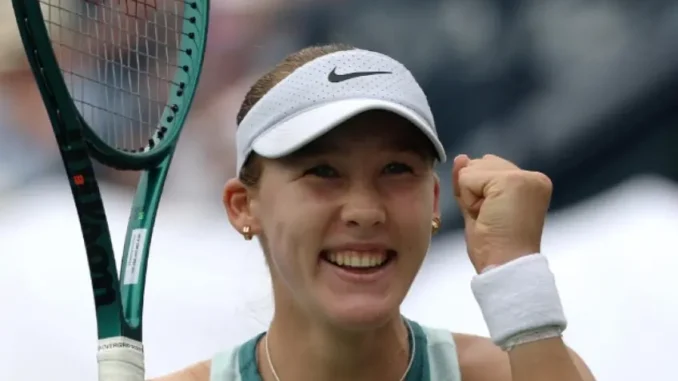
The tennis world, a theater of both physical prowess and mental fortitude, recently witnessed a remarkable upset in Dubai.1 Mirra Andreeva, the young Russian talent, achieved a stunning victory over Iga Swiatek, a player widely regarded as one of the best in the world. The triumph, a testament to Andreeva’s burgeoning skill, was also attributed to a crucial factor: the support of her sports psychologist. In the aftermath of the match, Andreeva openly discussed the pivotal role that mental preparation played in her success.
The match itself was a captivating display of tennis, a clash between the established dominance of Swiatek and the rising potential of Andreeva. The young Russian, facing a player of Swiatek’s caliber, entered the court with a daunting task ahead. However, she approached the challenge with a composure and focus that belied her age.
Andreeva’s performance was characterized by a blend of aggressive shot-making and tactical awareness. She displayed a remarkable ability to stay composed under pressure, a quality that proved crucial in overcoming Swiatek’s formidable game. This mental resilience, Andreeva revealed, was the result of dedicated work with her sports psychologist.
“It’s not just about hitting the ball,” Andreeva explained, her words highlighting the importance of mental preparation. “It’s about being able to handle the pressure, to stay focused when things get tough. That’s where my sports psychologist has helped me a lot.”
Andreeva’s openness about her work with a sports psychologist underscores the growing recognition of mental health’s significance in professional sports. The pressure to perform at the highest level, the constant scrutiny from the media, and the emotional rollercoaster of competition can take a significant toll on an athlete’s mental well-being.
“We work on different scenarios,” Andreeva elaborated. “We talk about how to handle difficult situations, how to stay positive, how to manage my emotions. It’s like having a mental coach who helps me prepare for anything that might happen on the court.”
This proactive approach to mental preparation proved to be a key factor in Andreeva’s victory over Swiatek. The young Russian displayed a remarkable ability to stay present in the moment, to avoid dwelling on past mistakes or anticipating future challenges. This mental clarity allowed her to execute her game plan with precision and confidence.
The match also highlighted the evolving nature of tennis. While physical fitness and technical skill remain essential, the mental aspect of the game is becoming increasingly crucial. Athletes are recognizing that the ability to control their emotions, to manage stress, and to maintain focus can be the difference between victory and defeat.
Andreeva’s victory has also sparked a broader discussion about the role of sports psychologists in athlete development. Many are recognizing that mental training should be integrated into an athlete’s overall training regimen, alongside physical and technical development.
“It’s not just about fixing problems,” one sports psychologist explained. “It’s about building mental resilience, about helping athletes develop the mental skills they need to thrive under pressure.”
Andreeva’s success story serves as a powerful testament to the benefits of mental training. Her ability to upset Swiatek, a player with a reputation for mental fortitude, demonstrates the impact that mental preparation can have on performance.
The young Russian’s openness about her work with a sports psychologist also helps to destigmatize the discussion of mental health in sports. By sharing her experiences, she is helping to create a culture where athletes feel comfortable seeking help and prioritizing their mental well-being.
The victory has also brought renewed attention to Andreeva’s burgeoning talent. She is now seen as a rising star in women’s tennis, a player with the potential to achieve great things. Her mental fortitude, combined with her impressive skill set, makes her a formidable opponent for any player on the tour.
The impact of this victory goes beyond the immediate result. It serves as a reminder that mental preparation is an essential component of athletic success. It also highlights the importance of creating a supportive environment for athletes, one that prioritizes their mental and emotional well-being. Andreeva’s story is an example of how a combination of skill, hard work, and good mental support can lead to great success.
Leave a Reply